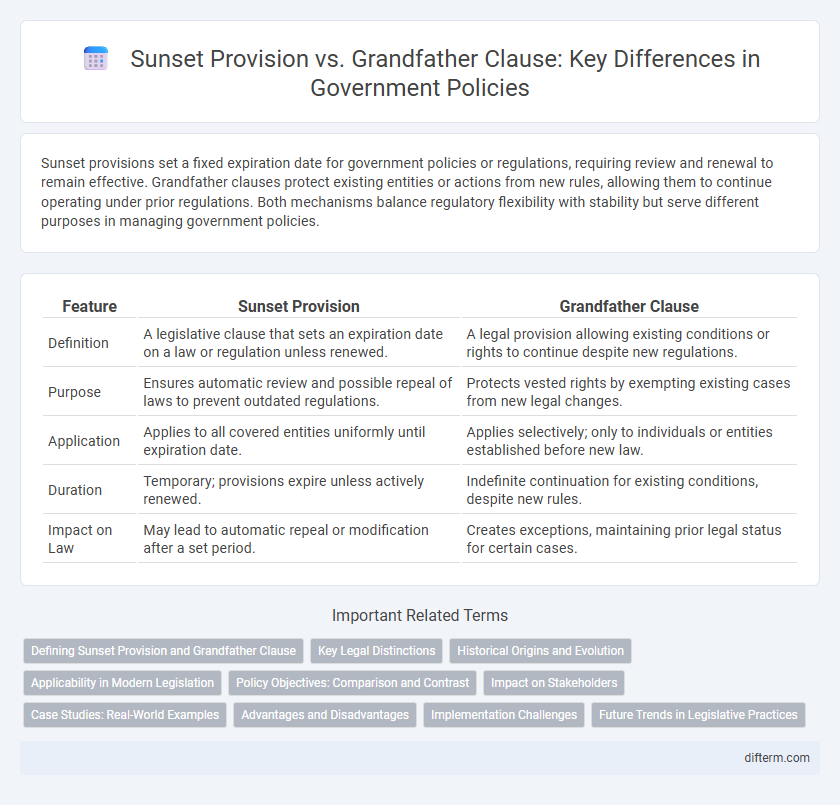Sunset provisions set a fixed expiration date for government policies or regulations, requiring review and renewal to remain effective. Grandfather clauses protect existing entities or actions from new rules, allowing them to continue operating under prior regulations. Both mechanisms balance regulatory flexibility with stability but serve different purposes in managing government policies.
Table of Comparison
| Feature | Sunset Provision | Grandfather Clause |
|---|---|---|
| Definition | A legislative clause that sets an expiration date on a law or regulation unless renewed. | A legal provision allowing existing conditions or rights to continue despite new regulations. |
| Purpose | Ensures automatic review and possible repeal of laws to prevent outdated regulations. | Protects vested rights by exempting existing cases from new legal changes. |
| Application | Applies to all covered entities uniformly until expiration date. | Applies selectively; only to individuals or entities established before new law. |
| Duration | Temporary; provisions expire unless actively renewed. | Indefinite continuation for existing conditions, despite new rules. |
| Impact on Law | May lead to automatic repeal or modification after a set period. | Creates exceptions, maintaining prior legal status for certain cases. |
Defining Sunset Provision and Grandfather Clause
A sunset provision is a legal measure that causes a law or regulation to expire after a specific date unless further legislative action is taken to renew it. In contrast, a grandfather clause allows pre-existing conditions or entities to continue operating under old rules even after new regulations are implemented. These mechanisms ensure regulatory flexibility by either phasing out outdated laws or preserving rights established before new statutes.
Key Legal Distinctions
Sunset provisions mandate the automatic expiration of a law or regulation after a specified period unless renewed, ensuring periodic legislative review and preventing indefinite enforcement. Grandfather clauses allow existing entities or individuals to continue operating under previous rules despite new regulations, protecting established rights from retroactive application. The key legal distinction lies in the temporary nature of sunset provisions versus the permanent exemption provided by grandfather clauses for pre-existing conditions.
Historical Origins and Evolution
Sunset provisions originated in the early 20th century as legislative tools designed to ensure laws or regulations expire unless explicitly renewed, reflecting a growing emphasis on accountability and periodic review in governance. Grandfather clauses trace back to post-Reconstruction America, initially used to exempt certain groups from new voting requirements, evolving into legal mechanisms allowing pre-existing rights or rules to persist despite new regulations. Both concepts demonstrate how legislative frameworks adapt to balance progress with continuity, reflecting shifting priorities in governmental policy-making over time.
Applicability in Modern Legislation
Sunset provisions impose automatic expiration dates on laws, requiring periodic legislative review to ensure continued relevance and effectiveness in modern governance. Grandfather clauses preserve the rights or privileges of existing entities or individuals when new regulations are enacted, maintaining their applicability without retroactive enforcement. Both mechanisms influence legislative adaptability, with sunset provisions promoting timely reassessment and grandfather clauses safeguarding established interests amid regulatory change.
Policy Objectives: Comparison and Contrast
Sunset provisions enforce automatic expiration dates on laws or regulations, ensuring periodic legislative review to maintain relevance and effectiveness in government policy. Grandfather clauses exempt existing entities or conditions from new regulations, preserving established rights and minimizing disruption during policy transitions. The key policy objective difference lies in sunset provisions promoting ongoing evaluation and potential repeal, while grandfather clauses prioritize stability and protection of vested interests.
Impact on Stakeholders
Sunset provisions create certainty for stakeholders by defining explicit end dates for laws or regulations, encouraging timely reviews and adjustments that align with evolving needs. Grandfather clauses protect existing stakeholders by allowing ongoing compliance under previous rules, reducing disruptions and preserving investments made under former regulations. The balance between these provisions impacts regulatory stability, innovation incentives, and the adaptability of governance frameworks.
Case Studies: Real-World Examples
Sunset provisions in government policy often appear in environmental regulations, such as the Clean Air Act amendments, where specific provisions automatically expire unless renewed, ensuring periodic legislative review. Grandfather clauses allowed existing businesses, like non-conforming land uses in zoning laws, to continue operations under prior rules despite new regulations, preserving vested interests while implementing policy changes. Case studies from urban planning highlight conflicts between sunset-provisioned reforms phasing out restrictions and grandfathered entities maintaining legacy rights, underscoring distinct mechanisms for regulatory transition management.
Advantages and Disadvantages
Sunset provisions offer clear deadlines for reevaluating laws, promoting legislative flexibility and accountability, yet they risk policy discontinuity if not renewed. Grandfather clauses provide stability by exempting existing entities from new regulations, reducing disruption but potentially perpetuating outdated practices and inequalities. Both mechanisms balance change and continuity, with sunset provisions favoring adaptability and grandfather clauses ensuring protection for vested rights.
Implementation Challenges
Sunset provisions pose implementation challenges due to strict deadlines requiring agencies to rapidly adjust or cease operations, often leading to resource allocation inefficiencies and enforcement gaps. Grandfather clauses complicate administration by creating legal discrepancies between new and existing entities, generating potential conflicts and increased oversight burdens. Both mechanisms demand meticulous legislative drafting to balance regulatory objectives with practical governance constraints.
Future Trends in Legislative Practices
Sunset provisions are increasingly incorporated to ensure periodic legislative review and adaptation, allowing laws to expire unless explicitly renewed, enhancing governmental accountability and flexibility. Grandfather clauses remain relevant but face scrutiny for potentially perpetuating outdated rules, prompting reforms to balance continuity with modernization. Emerging trends emphasize integrating data-driven evaluations alongside sunset clauses to optimize law lifecycle management and responsiveness to societal changes.
sunset provision vs grandfather clause Infographic

 difterm.com
difterm.com